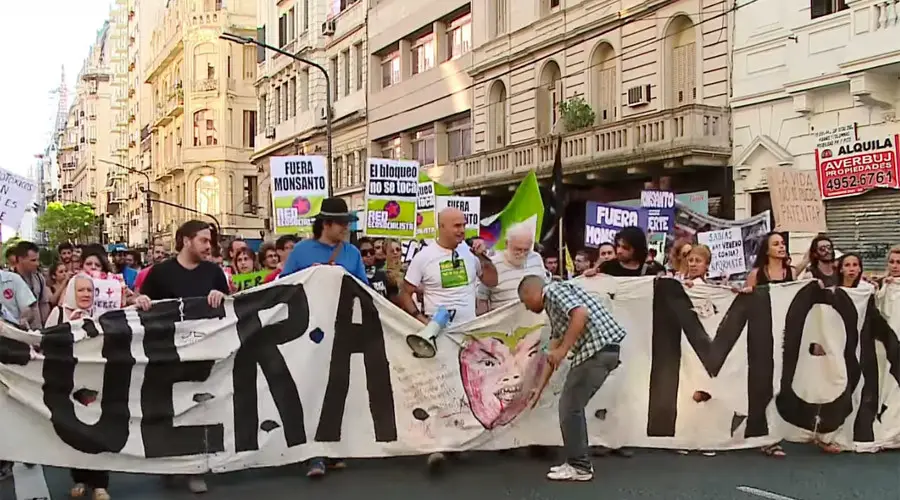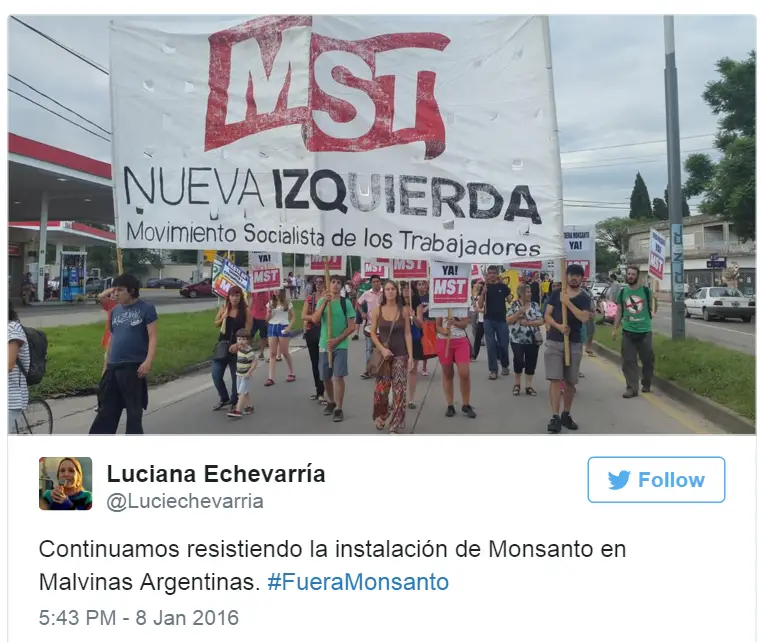
A sign in Buenos Aires reading “Get Out Monsanto.” Photo via Ruptly.
The worldwide March Against Monsanto happens every single May to re-energize the clean food movement across the world, but for Argentinians under the clutches of Monsanto and their system of toxic farm chemicals, there’s no time to spare.
South America’s third largest country* is experiencing a health crisis in many areas in large part due to its adoption of genetically engineered crops and agrochemicals. In Sante Fe province, the capital of Argentina’s GMO soy industry, the cancer rate is 2 to 4 times the national average. The Associated Press reported a frightening 90% cancer rate increase in Argentina since 1997, beginning just one year after Monsanto entered the country in 1996. And birth defects have also quadrupled in Argentina’s rural farming belt areas, where as many as 12 million people reside.
On Friday, January 8, the streets of the capital city Buenos Aires erupted in protest as activists donned gas masks, unfurled banners and marched to the beat of drums, demanding that Monsanto abandon their plans for building the world’s largest maize seed treatment plant and warning the multi-national Biotech company to “get out” of their country.

Protesters in gas masks rally against Monsanto. Photo via RT/Ruptly
Monsanto Ignoring Court Orders?
According to an article about the protest from RT, Monsanto has continually ignored court orders preventing from building its plants in Argentina’s rich agricultural areas, and continues to insist on building its factories anyway.
Monsanto owns land in Malvinas where it is hoping to build the plant, but a labor appeals court in north-central Argentina ruled two years ago that the plant was unconstitutional. Work on the plant has stopped, but Monsanto’s presence looms.
“Monsanto has for a long time been attempting to install itself in areas illegally, where court decisions have previously blocked the development plan, and has failed with all its political pressure to win a legal method to install its project,” said environmental lawyer Enrique Viale to RT.
Protesters have set up an activist camp in the area, keeping watch over the region and attempting to prevent Monsanto from building what would be the 2nd largest seed plant in Latin America. But the campers were recently evicted by authorities, prompting the rally.
Argentina is the world’s third largest producer of GMO soy, and the adoption of the highly controversial crops has followed a similar, haunting pattern for local citizens as seen in other parts of the world where Monsanto is welcomed by the government with open arms.. At first, the use of pesticides went down, and more and more farmers began adopting the transgenic seeds.
But then, as farmers stopped tilling the soil to kill weeds and pests and weeds became resistant, the farmers had no choice but to buy and use more and more toxic agrochemicals, which many believe has polluted the land and contributed to exploding rates of cancer and birth defects.
The total amount of pesticides used in Argentina has skyrocketed from 9 million gallons to 84 million in 2012 according to an Associated Press report citing data from Argentina’s pesticide industry chamber.

One of the many Tweets from Friday’s rally.
Monsanto’s Revolving Door in Argentina (Just Like the U.S.)
Much like in the United States, activists worry about a “revolving door” situation unfolding in Argentina. Just recently, Buenos Aries Governor Maria Eugenia Vidal appointed former Monsanto executive Leonard Sarquis as Minister of Agriculture in the province, much as Barack Obama did with pro-Monsanto Agriculture Secretary Tom Vilsack in the United States (and others). President Mauricio Macri has also removed agricultural taxes on big agrobusiness corporations, further angering activists.
As Argentina continues to become “The Country That Monsanto Poisoned” according to activists and alternative journalists, citing the country’s official statistics for cancer and other diseases, the movement will continue to grow, as Saturday’s rallies showed.
“We are ‘in favor of food sovereignty and life,’” activists said prior to the 2013 Monsanto plant blockade.
“In Rosario we also say “Out with Monsanto!” Against agrochemicals, for food sovereignty and our people!” said activist Fernando Rey on Twitter.
You can watch a video of the landmark protests below (and subscribe to our email list here for more articles like these in your inbox).
*third-largest in terms of population
Thanks for installing the Bottom of every post plugin by Corey Salzano. Contact me if you need custom WordPress plugins or website design.




